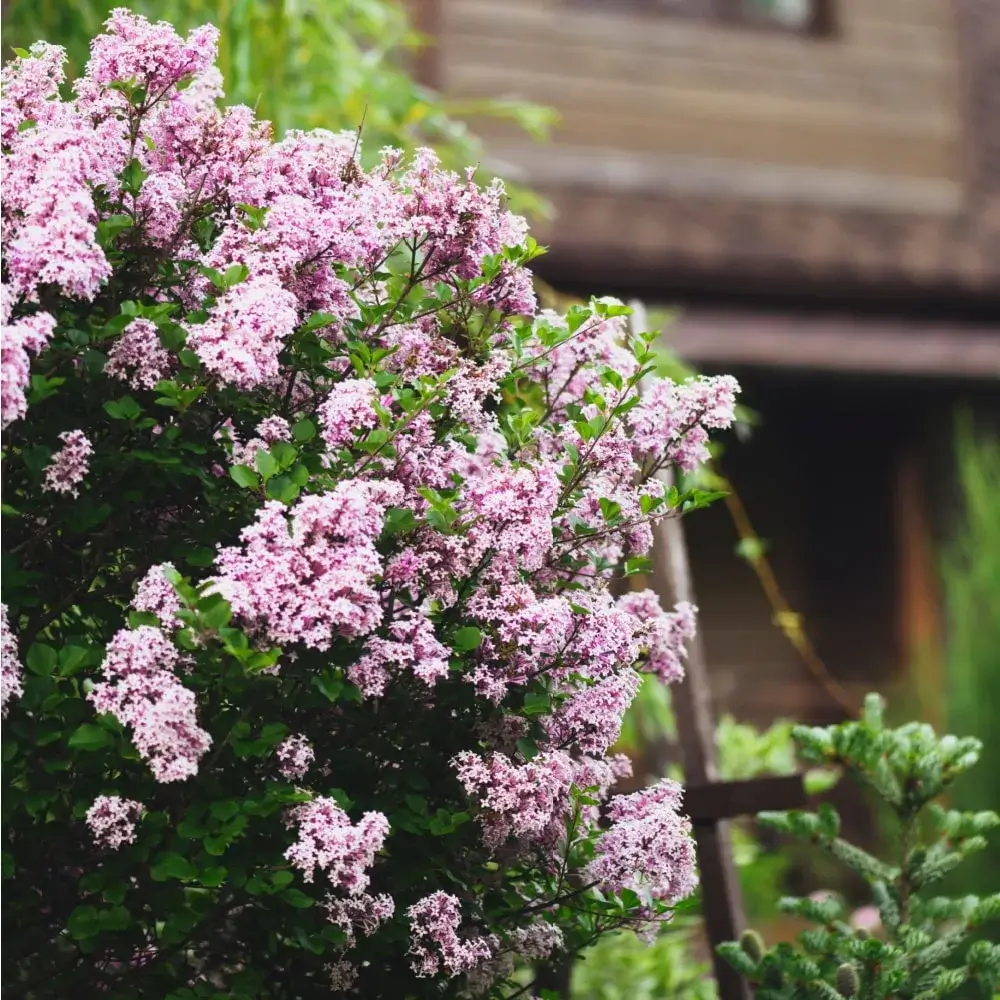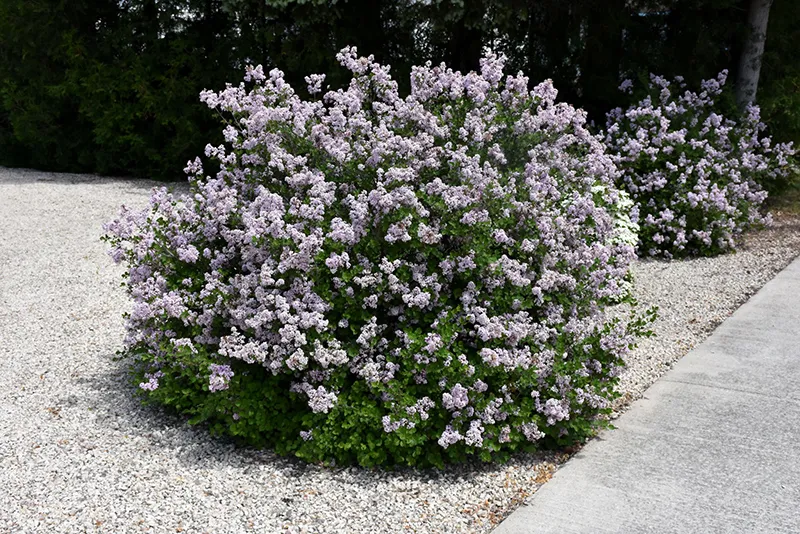Family: Lilac
Type: Shrub

Dwarf Korean Lilac, scientifically known as Syringa meyeri ‘Palibin’, is a compact and hardy flowering shrub renowned for its stunning spring bloom. This smaller variety of lilac is perfect for gardens where space is limited but the desire for colorful and fragrant flowers is high. The Dwarf Korean Lilac is particularly known for its abundant clusters of lavender-pink flowers that fill the air with a sweet, pleasant fragrance.
Growing to about 4-5 feet in height and width, this lilac variety is ideal for small gardens, borders, and container plantings. Its manageable size makes it a versatile choice for various garden designs. The plant maintains a neat, rounded shape with minimal pruning, and its dark green leaves provide a lush backdrop to its vibrant blooms.
Thriving in full sun, Dwarf Korean Lilac prefers well-drained soil and is relatively drought-tolerant once established. It’s a low-maintenance plant, requiring minimal care beyond occasional pruning to maintain its shape. This lilac variety is resistant to many of the diseases and pests that can affect larger lilac species, making it a hardy choice for gardeners of all skill levels.
Hardiness Zone: 3a-5a
Pet Friendly: Yes
Moisture Preference: Dry to moist
Sun Needs: Full sun
Growth Rate: Slow
Average Height (feet): 4
Average Spread (feet): 5
Average Life Span (years): 30
Form: Round
Flower Color: Purple
Bloom Season: In late spring
Foliage Color: Green
Foliage Shape: Pointy
Bark Color: Gray
Bark Texture: Smooth
Dwarf Korean Lilac is perfect for creating fragrant, colorful accents in the garden. Its compact size and stunning blooms make it an excellent choice for adding interest to mixed borders, foundation plantings, or as a standalone specimen. Plant it near outdoor living areas where its fragrance can be enjoyed.
Incorporate this lilac into cottage gardens or use it as a low hedge along property lines or walkways. Its dense, rounded form and fragrant flowers make it great for creating a sensory experience in the garden. Dwarf Korean Lilac is also suitable for container gardening, bringing its charming blooms to patios, decks, or balconies.
Due to its ornamental appeal, Dwarf Korean Lilac can be used as a focal point in small garden designs. It pairs well with a variety of perennials and shrubs, enhancing the overall aesthetics of the garden with its springtime display.

In cottage gardens, Dwarf Korean Lilac adds a touch of romance and nostalgia. Its abundant blooms and sweet fragrance are quintessential elements of this garden style.
For formal gardens, Dwarf Korean Lilac can be used to create symmetry and structure. Its neat growth habit and consistent blooming make it a suitable choice for formal designs.
Dwarf Korean Lilac is an ideal choice for urban gardens due to its compact size and adaptability. It can thrive in smaller spaces while providing significant visual and olfactory interest.
Use Dwarf Korean Lilac in small garden spaces where its compact size and delightful fragrance can be fully appreciated. Plant it near windows or seating areas where the blooms can be enjoyed up close.
Select our pre-made garden layouts to create a landscape that’s uniquely yours. Simple, smart, and customizable!
In spring, Dwarf Korean Lilac bursts into bloom, covering the shrub in fragrant lavender-pink flowers that attract butterflies and other pollinators.
During summer, the plant maintains its lush green foliage, providing a neat and tidy appearance in the garden.
In the fall, the leaves of Dwarf Korean Lilac may turn to subtle shades of yellow before falling, adding a brief touch of autumn color.
In winter, the bare branches of Dwarf Korean Lilac still offer structural interest in the landscape, especially when contrasted against evergreens or snowy backgrounds.
Dwarf Korean Lilac should be planted in an area that receives full sun to ensure abundant flowering. It’s ideal for small garden spaces, mixed borders, and can be used as a decorative container plant.
This lilac variety thrives in full sun. It requires at least 6 hours of direct sunlight per day for optimal blooming.
Prefers well-drained soil with a slightly acidic to neutral pH. It is adaptable to various soil types, but poor drainage can lead to root issues.
Space plants about 5 feet apart. This spacing accommodates their mature size and allows for adequate air circulation, which is vital for plant health.
The best time to plant Dwarf Korean Lilac is in the spring or fall, avoiding the extremes of summer heat and winter cold.
Dig a hole twice as wide and just as deep as the root ball. Place the plant in the hole, backfill with soil, water thoroughly, and apply a layer of mulch to conserve moisture.
Water regularly during the first growing season to establish a deep, extensive root system. Once established, it is moderately drought-tolerant but benefits from occasional watering during dry spells.
Fertilize in early spring with a balanced, slow-release fertilizer to encourage healthy growth and flowering.
Prune immediately after blooming to shape the plant and remove spent flowers. This encourages healthy new growth and better blooms the following season.
Remove any winter debris and prune as needed. Start regular watering and fertilizing as new growth begins.
Maintain consistent watering, especially in periods of drought. Monitor for pests and diseases.
Prepare the plant for winter by reducing watering. Apply a layer of mulch for root protection in colder climates.
No special care is needed in winter. Dwarf Korean Lilac is hardy and can withstand cold temperatures once established.
Yes, its fragrant flowers attract butterflies and bees, making it an excellent choice for pollinator-friendly gardens.
Absolutely, its compact size makes it well-suited for container gardening, provided it’s planted in a large enough pot with proper drainage.
It has a moderate growth rate, usually taking several years to reach its full size of 4-5 feet in height and width.
Sign up below to get exclusive deals, discounts, and new plant collections—delivered straight to your inbox! Plus, stay inspired with the latest gardening tips, landscaping trends, and DIY garden ideas. Start growing with us today!
A big thank you for subscribing to the PBN Design newsletter.
We're thrilled to have you join our community. Get ready for exciting updates, insightful content, and more delivered straight to your inbox.
Stay tuned!
Go backA big thank you for subscribing to the PBN Design newsletter.
We're thrilled to have you join our community. Get ready for exciting updates, insightful content, and more delivered straight to your inbox.
Stay tuned!
Go back